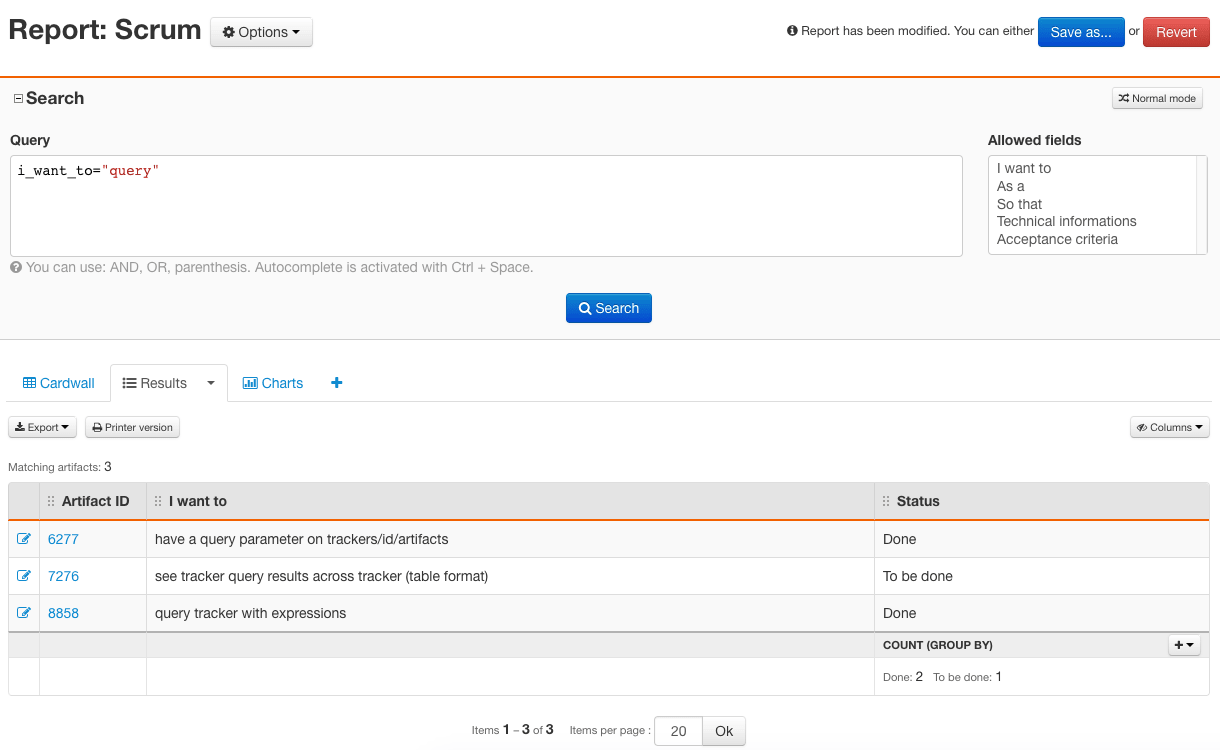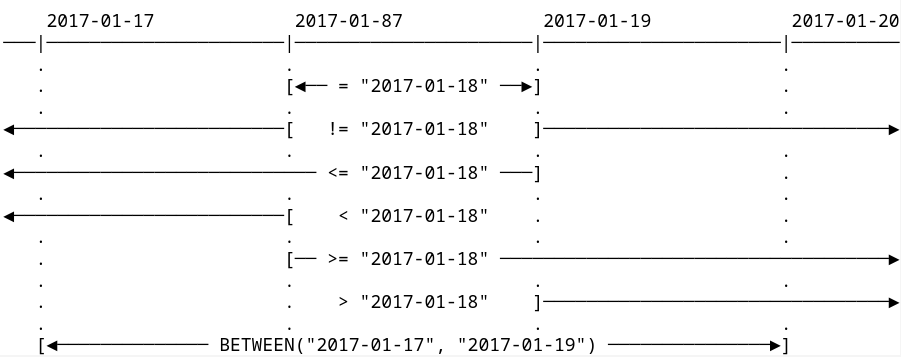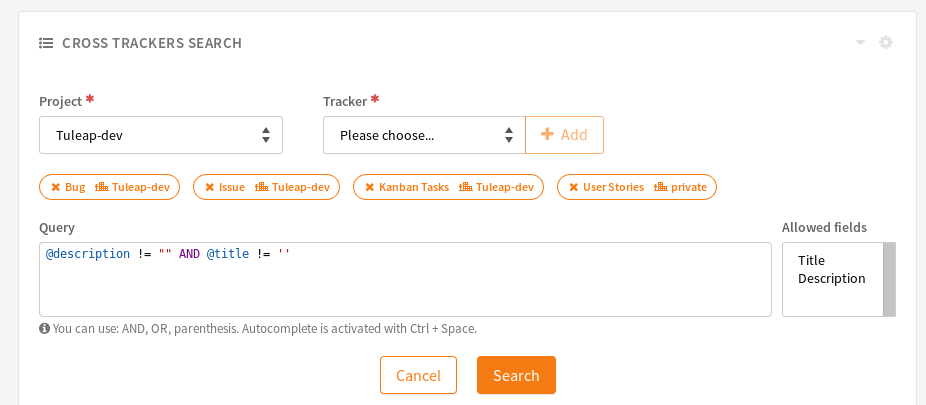Tuleap Query Language (TQL)
The Tuleap Query Language is a pseudo-language to search items in the platform. As of today only artifacts in trackers can be retrieved.
TQL on reports
TQL can be used in “Expert” mode on tracker’s reports in the search area. The saving of the query matches the usual saving of the report.

Tuleap Query Language on reports
Queries
Currently, the language supports:
Logical operators:
AND,ORParenthesis to force precedence
Comparison operators
For string, text, files, and @comments:
=,!=For date, integer and float fields:
=,!=,<,<=,>,>=,BETWEEN()For list fields:
=,!=,IN(),NOT IN()
Comparison values
For string, text, and files fields:
stringFor integer fields:
stringconvertible to integer,integerFor float fields:
stringconvertible to float,integer,floatFor date fields:
stringconvertible to date,NOW()For list fields:
allmatching list bind valuesFor list fields bound to users:
stringusing user names,MYSELF()For list fields bound to user groups:
stringmatching either the name of a user-defined (“Static”) user group (e.g."Customers") or matching the translated system-defined (“Dynamic”) user group name (e.g."Project members").For @comments:
string
Dynamic value for date fields: NOW()
start_date > NOW()matches all artifacts where start_date is greater than the current time (time when the query is displayed).You can use interval periods with NOW(), for example
submitted_on > NOW() - 1mwill matches all artifacts that have been created during the last month. The supported specificators are:years (
y)months (
m)weeks (
w)days (
d)
Dynamic value for list fields bound to users: MYSELF()
assigned_to = MYSELF() matches all artifacts where assigned_to is equal to the current user.
Search in comments
@comments = 'Lorem ipsum'matches all artifacts where at least one follow-up comment contains the stringlorem ipsum@comments = ''returns the list of artifacts without any comments@comments != ''returns the list of artifacts with at least one comment
When searching in comments, you should be aware of some limitations:
Searches are done for words longer than 3 characters
Some words are not taken in account because they are too common (like
the,a, …)
Search in files
attachment = 'minutes'matches all artifacts where there is at least one attached file with the filename “Minutes-20180101.docx” or the description “Minutes of last meeting” contains the stringminutes
attachment != 'minutes'matches all artifacts where there isn’t any attached files with filename or description containingminutes.
attachment = ''matches all artifacts without any attached files
attachment != ''matches all artifacts that have at least one attached file
Search for linked artifacts
Generic syntax
Artifact links make an oriented graph: you have to specify in which direction the links should be matched with TO or FROM:
Forward links
IS LINKED TOmatches all artifacts that have a link to another artifactIS NOT LINKED TOmatches all artifacts that don’t have a link to another artifact
Reverse links
IS LINKED FROMmatches all artifacts that are linked to by another artifactIS NOT LINKED FROMmatches all artifacts that are not linked to by another artifact
Link type
The query can be refined by specifying the type of the link: WITH TYPE 'my_type'.
For example if you want to target all “fixed in” requests: IS LINKED TO WITH TYPE 'fixed_in'.
Origin & destination
Origin or destination can also be specified: to match an artifact ARTIFACT = 123, a tracker TRACKER = 'epic', or a different tracker TRACKER != 'epic'.
IS LINKED FROM ARTIFACT = 123matches all artifacts that are linked to by the artifact #123.IS LINKED TO TRACKER = 'release' WITH TYPE 'fixed_in'matches all artifacts that are “fixed in” an artifact ofreleasetracker.IS LINKED TO TRACKER != 'release' WITH TYPE 'fixed_in'matches all artifacts that are “fixed in” an artifact other thanreleasetracker.
Query aliases
Some builtin types are not easy to express/understand (hello _is_child 👋) so TQL offers some aliases for better expressiveness of the query.
Search for parent relationship
WITH PARENTmatches all artifacts that have a parent artifact (alias ofIS LINKED FROM WITH TYPE '_is_child')WITHOUT PARENTmatches all artifacts that don’t have a parent artifact (alias ofIS NOT LINKED FROM WITH TYPE '_is_child')WITH PARENT ARTIFACT = 123matches all artifacts that have artifact #123 as a parent (alias ofIS LINKED FROM ARTIFACT = 123 WITH TYPE '_is_child')WITHOUT PARENT ARTIFACT = 123matches all artifacts that don’t have artifact #123 as a parent (alias ofIS NOT LINKED FROM ARTIFACT = 123 WITH TYPE '_is_child')WITH PARENT TRACKER = 'epic'matches all artifacts that have an artifact from trackerepic(regardless of the project) as a parent (alias ofIS LINKED FROM TRACKER = "epic" WITH TYPE '_is_child')WITHOUT PARENT TRACKER = 'epic'matches all artifacts that don’t have an artifact from trackerepic(regardless of the project) as a parent (alias ofIS NOT LINKED FROM TRACKER = "epic" WITH TYPE '_is_child')
Search for children relationship
WITH CHILDRENmatches all artifacts that have a least one child artifact (alias ofIS LINKED TO WITH TYPE '_is_child')WITHOUT CHILDRENmatches all artifacts that don’t have a child artifact (alias ofIS NOT LINKED TO WITH TYPE '_is_child')WITH CHILDREN ARTIFACT = 123matches all artifacts that have artifact #123 as a child (alias ofIS LINKED TO ARTIFACT = 123 WITH TYPE '_is_child')WITHOUT CHILDREN ARTIFACT = 123matches all artifacts that don’t have artifact #123 as a child (alias ofIS NOT LINKED TO ARTIFACT = 123 WITH TYPE '_is_child')WITH CHILDREN TRACKER = 'task'matches all artifacts that have an artifact from trackertask(regardless of the project) as a child (alias ofIS LINKED TO TRACKER = "epic" WITH TYPE '_is_child')WITHOUT CHILDREN TRACKER = 'task'matches all artifacts that don’t have an artifact from trackertask(regardless of the project) as a child (alias ofIS NOT LINKED TO TRACKER = "epic" WITH TYPE '_is_child')
Note
You can use both CHILD and CHILDREN in queries to better suit your taste:
WITH CHILDREN ARTIFACT = 123 is the same than WITH CHILD ARTIFACT = 123
Search for test coverage
Looking for test coverage is another common use case that benefits of a dedicated syntax:
IS COVEREDmatches all artifacts (eg: user stories) that are covered by tests (alias ofIS LINKED TO WITH TYPE '_covered_by')IS COVERED BY artifact = 123matches all artifacts (eg: user stories) that covered by test 123 (alias ofIS LINKED TO ARTIFACT = 123 WITH TYPE '_covered_by')IS NOT COVEREDmatches all artifacts (eg: user stories) that are not covered by any test (alias ofIS NOT LINKED TO WITH TYPE '_covered_by')IS COVERINGmatches all artifacts (eg: tests) that are covering other artifacts (eg: user stories) (alias ofIS LINKED FROM WITH TYPE '_covered_by')IS COVERING artifact = 123matches all artifacts (eg: tests) that are covering artifact (eg: user story) 123 (alias ofIS LINKED FROM ARTIFACT = 123 WITH TYPE '_covered_by')IS NOT COVERINGmatches all artifacts (eg: tests) that doesn’t cover any other artifacts (eg: user stories) (alias ofIS NOT LINKED FROM WITH TYPE '_covered_by')
Query construction
To construct a query you can combine all these elements.
Query example:
(summary = "soap" OR summary = "rest")
AND description = "documentation" AND story_points BETWEEN(3, 8)
Note
Be careful, you must use the name of fields and not the label to construct queries.
Sending the query to the server can throw the following errors:
The query syntax is incorrect (e.g. if you forget a closing quote)
The name doesn’t match any existing field name
The value is not defined for the list field (e.g.
assigned_to = "non_existent_user")The dynamic value is not supported for this field (e.g.
text_field = NOW())The comparison operator is not supported for this field (e.g.
list_field >= 3)The empty value is not allowed for this comparison (e.g.
date_field BETWEEN("", "2017-01-18"))The query uses MYSELF() and the current user is not logged in (when browsing a Tuleap platform as an anonymous user)
The field type is unsupported
The query is too complex
Important
The query is too complex when it exceeds a limit. This limit is defined by SiteAdministrators on SiteAdmin > Tracker > Report.
Pro-tips
For a better usability in building query there is a syntax highlighting
and an auto-completion (ctrl+space on field names).

Highlighting and auto-completion
Moreover to know allowed fields there is a select box with all usable fields. If you click on one of them the field’s name is introduced in the query.

Allowed fields
Date operators
When searching on date fields using TQL, you should be aware of the sometimes subtle differences between the various operators. We have found this diagram helpful. Here, we use all available operators supporting date fields and a given date (“2017-01-18”) and represent the period that will be selected as a result. For example, date_field > "2017-01-18" means date_field is later than 2017-01-18 23:59:59, while date_field >= "2017-01-18" means date_field is later than or equal to 2017-01-18 00:00:00

Explanation of date operators
TQL on cross-tracker search
Attention
This module is part of Tuleap Entreprise. It might not be available on your installation of Tuleap.
TQL can also be used in the cross-tracker widget, in the search area.

TQL on cross-tracker search
Semantics and some dynamic fields such as the Submission date (“Submitted On”) can be used to search on multiple trackers. The following keywords are supported:
- String/Text semantics:
@title: the “Title” semantic. It behaves like a string field.@description: the “Description” semantic. It behaves like a text field.
- Dates:
@submitted_on: the “Submitted On” dynamic field. It behaves like a date field, but the empty string''is not allowed (this field cannot be empty).@last_update_date: the “Last Update Date” dynamic field. It behaves like a date field, but the empty string''is not allowed (this field cannot be empty).
- Lists:
@status: the “Status” semantic. It behaves like a list, but can only be compared toOPEN()
- Lists bound to users:
@submitted_by: the “Submitted By” dynamic field. It behaves like a list and can have only a single value at a time.@last_update_by: the “Last Updated by” dynamic field. It behaves like a list and can have only a single value at a time.@assigned_to: the “Contributor/assignee”`` semantic. It behaves like a list and can have multiple values at a time (multiple users assigned to an artifact).
- You can also search on any custom field with its name as long as there is at least one Tracker with a compatible definition. We consider that 2 fields from 2 Trackers are compatible if:
You can see both fields
They have the same name
Their types are compatible
- Compatible field types:
Numerics: integer and float
Lists with same bind (user, user group, static)
String and text
Date
Date time
TQL behavior to search on these fields is the same as for classic single tracker search.
Preconditions for multi-tracker search
When you use a semantic, all selected trackers must have it configured and all fields linked to the semantic must be readable by the current user.
For example, if you run an expert query containing @status, all selected trackers must have defined a “Status” semantic and the “Status” field must be readable by the user viewing the widget.
If one of the trackers does not define the “Status” semantic, it will cause an error to be shown. The same is true for permissions: if one of the “Status” fields is not readable by the current user, an error will be displayed.
When you use a dynamic field, for all selected trackers it must be added in the tracker and it must be readable by the current user.
- Supported dynamic fields are the following:
“Submitted On”: The creation date of the artifact.
“Submitted By”: The user who first created the artifact.
“Last Updated Date”: The date of the last change to the artifact.
“Last Updated By”: The user who made the last change to the artifact.
For example, if you run an expert query containing @last_update_date, all selected trackers must have a “Last update date” field and that field must be readable by the user viewing the widget.
If one of the trackers does not have a “Last update date” field, it will cause an error to be shown. The same is true for permissions: if one of the “Last update date” fields is not readable by the current user, an error will be displayed.
Queries
Currently, the query supports:
Logical operators:
AND,ORParenthesis to force precedence
Supported comparisons
For @title and @description:
=,!=For @status:
= OPEN(),!= OPEN().OPEN()is the only supported value.For @submitted_on and @last_update_date:
=,!=,<,<=,>,>=,BETWEEN().For @submitted_by and @last_update_by:
=,!=,IN(),NOT IN().
Comparison values
For @title and @description:
stringFor @status:
OPEN()is the only supported valueFor @submitted_on and @last_update_date:
stringconvertible to date,NOW()and dynamic values based onNOW(). For example:NOW() -1m,NOW() -6w, …For @submitted_on and @last_update_date: the empty string
''cannot be used. Those fields always have a value, therefore the comparison to “empty” is not useful.For @submitted_by, @last_update_by and @assigned_to:
stringmatching a user,MYSELF()
Search for linked artifacts
Generic syntax
Artifact links make an oriented graph: you have to specify in which direction the links should be matched with TO or FROM:
Forward links
IS LINKED TOmatches all artifacts that have a link to another artifactIS NOT LINKED TOmatches all artifacts that don’t have a link to another artifact
Reverse links
IS LINKED FROMmatches all artifacts that are linked to by another artifactIS NOT LINKED FROMmatches all artifacts that are not linked to by another artifact
Link type
The query can be refined by specifying the type of the link: WITH TYPE 'my_type'.
For example if you want to target all “fixed in” requests: IS LINKED TO WITH TYPE 'fixed_in'.
Origin & destination
Origin or destination can also be specified: to match an artifact ARTIFACT = 123, a tracker TRACKER = 'epic', or a different tracker TRACKER != 'epic'.
IS LINKED FROM ARTIFACT = 123matches all artifacts that are linked to by the artifact #123.IS LINKED TO TRACKER = 'release' WITH TYPE 'fixed_in'matches all artifacts that are “fixed in” an artifact ofreleasetracker.IS LINKED TO TRACKER != 'release' WITH TYPE 'fixed_in'matches all artifacts that are “fixed in” an artifact other thanreleasetracker.
Query aliases
Some builtin types are not easy to express/understand (hello _is_child 👋) so TQL offers some aliases for better expressiveness of the query.
Search for parent relationship
WITH PARENTmatches all artifacts that have a parent artifact (alias ofIS LINKED FROM WITH TYPE '_is_child')WITHOUT PARENTmatches all artifacts that don’t have a parent artifact (alias ofIS NOT LINKED FROM WITH TYPE '_is_child')WITH PARENT ARTIFACT = 123matches all artifacts that have artifact #123 as a parent (alias ofIS LINKED FROM ARTIFACT = 123 WITH TYPE '_is_child')WITHOUT PARENT ARTIFACT = 123matches all artifacts that don’t have artifact #123 as a parent (alias ofIS NOT LINKED FROM ARTIFACT = 123 WITH TYPE '_is_child')WITH PARENT TRACKER = 'epic'matches all artifacts that have an artifact from trackerepic(regardless of the project) as a parent (alias ofIS LINKED FROM TRACKER = "epic" WITH TYPE '_is_child')WITHOUT PARENT TRACKER = 'epic'matches all artifacts that don’t have an artifact from trackerepic(regardless of the project) as a parent (alias ofIS NOT LINKED FROM TRACKER = "epic" WITH TYPE '_is_child')
Search for children relationship
WITH CHILDRENmatches all artifacts that have a least one child artifact (alias ofIS LINKED TO WITH TYPE '_is_child')WITHOUT CHILDRENmatches all artifacts that don’t have a child artifact (alias ofIS NOT LINKED TO WITH TYPE '_is_child')WITH CHILDREN ARTIFACT = 123matches all artifacts that have artifact #123 as a child (alias ofIS LINKED TO ARTIFACT = 123 WITH TYPE '_is_child')WITHOUT CHILDREN ARTIFACT = 123matches all artifacts that don’t have artifact #123 as a child (alias ofIS NOT LINKED TO ARTIFACT = 123 WITH TYPE '_is_child')WITH CHILDREN TRACKER = 'task'matches all artifacts that have an artifact from trackertask(regardless of the project) as a child (alias ofIS LINKED TO TRACKER = "epic" WITH TYPE '_is_child')WITHOUT CHILDREN TRACKER = 'task'matches all artifacts that don’t have an artifact from trackertask(regardless of the project) as a child (alias ofIS NOT LINKED TO TRACKER = "epic" WITH TYPE '_is_child')
Note
You can use both CHILD and CHILDREN in queries to better suit your taste:
WITH CHILDREN ARTIFACT = 123 is the same than WITH CHILD ARTIFACT = 123
Search for test coverage
Looking for test coverage is another common use case that benefits of a dedicated syntax:
IS COVEREDmatches all artifacts (eg: user stories) that are covered by tests (alias ofIS LINKED TO WITH TYPE '_covered_by')IS COVERED BY artifact = 123matches all artifacts (eg: user stories) that covered by test 123 (alias ofIS LINKED TO ARTIFACT = 123 WITH TYPE '_covered_by')IS NOT COVEREDmatches all artifacts (eg: user stories) that are not covered by any test (alias ofIS NOT LINKED TO WITH TYPE '_covered_by')IS COVERINGmatches all artifacts (eg: tests) that are covering other artifacts (eg: user stories) (alias ofIS LINKED FROM WITH TYPE '_covered_by')IS COVERING artifact = 123matches all artifacts (eg: tests) that are covering artifact (eg: user story) 123 (alias ofIS LINKED FROM ARTIFACT = 123 WITH TYPE '_covered_by')IS NOT COVERINGmatches all artifacts (eg: tests) that doesn’t cover any other artifacts (eg: user stories) (alias ofIS NOT LINKED FROM WITH TYPE '_covered_by')
Example
@title = 'documentation' AND @status = OPEN() AND @last_update_date > NOW() - 1w
//Returns all open artifacts with 'documentation' in the title that have been
//updated during the last week.
@title = 'documentation' AND @submitted_by = 'alice' AND @assigned_to IN (MYSELF(), 'charles')
//Returns all artifacts with 'documentation' in the title that have been submitted
//by user 'alice' and are assigned to the viewing user (for example 'bob')
//or user 'charles'.
